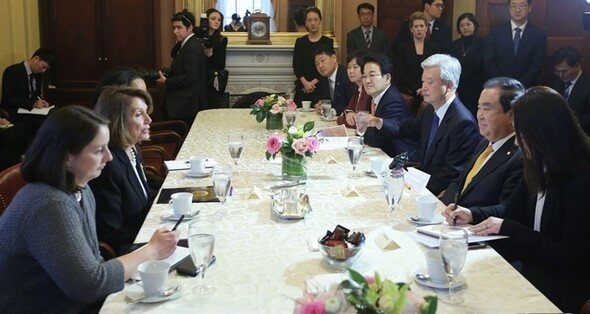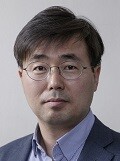hankyoreh
Links to other country sites 다른 나라 사이트 링크
[Correspondent’s column] The stubborn skepticism of US mainstream regarding N. Korea

The discussion during a Feb. 12 meeting between South Korean National Assembly Speaker Moon Hee-sang, the leaders of the ruling and opposition parties and US Speaker of the House Nancy Pelosi, was apparently quite heated. Recalling her own experience visiting North Korea in 1997, Pelosi said that she doesn’t trust North Korea.
Considering that Justice Party leader Lee Jeong-mi urged Pelosi to visit North Korea, which she said “is not the same as it was during the ‘arduous march,’” and that Party for Democracy and Peace leader Chung Dong-young said that “the solution to the North Korean nuclear program originated with the ‘Perry Process,’ which was created under a Democratic administration,” the mood during the meeting can be inferred. Pelosi wrapped up the meeting by saying, “I hope that I’m wrong and you’re right.”
A nearly unprecedented team of heavyweights convened to visit Washington, DC, in order to communicate South Korea’s position and expectations to the US, where there is widespread skepticism, leading up to the second North Korea-US summit. During meetings with US politicians and experts, members of the team made an enthusiastic and sincere effort to make their case and seek cooperation. But there was never any chance that a whistle-stop tour would reverse the deep-rooted distrust of North Korea and the antipathy to Trump both inside and outside of the US political establishment.
Pelosi is just one person who reflects the dominant viewpoint in the American political establishment, the mainstream media and think tanks. Such people aren’t impressed by North Korea’s suspension of nuclear and missile testing since Nov. 2017, its willingness to demolish its Yongbyon nuclear facility and its focus on an economic line. Rather than noting the intransigency of the North Korean nuclear issue, which has remained unsolvable for 26 years, since the North announced its withdrawal from the Treaty on the Non-Proliferation of Nuclear Weapons (NPT) in early 1993, they demand to know what has changed during the eight months since the first North Korea-US summit in June 2018. It’s characteristic of the mood in Washington for experts to nonchalantly portray North Korea as a criminal who demands to be rewarded for not robbing the bank on a given day.
Upcoming 2nd summit necessary for concrete results
Some comfort can be found in the fact that people are much more eager, prudent and practical in the run up to the Hanoi summit than at the time of the first summit in Singapore. Even some of the advocates for dialogue in Washington are saying that they’ll join the camp of the pessimists if nothing concrete results from the second summit. Given their sensitivity to domestic politics and international assessments, neither Trump nor North Korean leader Kim Jong-un could have failed to notice such a trend. White House National Security Advisor John Bolton nearly torpedoed last year’s summit by demanding that North Korea hand over its nuclear arsenal to the US facility at Oak Ridge, Tennessee, but more recently even Bolton has receded into the background.
Efforts to tone down expectations for 2nd N. Korea-US summit
What’s particularly notable is that expectations are being moderated and efforts are underway to grasp the situation prior to the summit, which stands in contrast to all the hype surrounding the two leaders’ “first meeting” last year. During a speech at Stanford prior to visiting North Korea in early February, US State Department Special Representative for North Korea Stephen Biegun presented a security guarantee for the North Korean regime and the principle of gradual and simultaneous denuclearization. The US was effectively declaring its abandonment of its previous stance that the North must make a full disclosure of its nuclear inventory and shifting to a policy of taking things slow and moving forward one step at a time. Following Biegun’s visit to North Korea, he provided South Korean politicians with an honest appraisal of the state of the negotiations during two meetings, one in Seoul and one in Washington.

When it comes to North Korea’s potential steps toward denuclearization and the US’ potential corresponding measures, pretty much all the cards are on the table. The remaining questions are what concessions North Korea will make on top of its demolition of the Yongbyon nuclear facilities and whether the US will offer to relax sanctions, even partially, which might mean reopening the Kaesong Industrial Complex and resuming tours to Mt. Kumgang.
“After more than two years of pushing and shoving, they’ve finally sat down and asked each other what they want,” said one lawmaker who met with Biegun. “If we expect a lot from this summit, I think we’ll end up being very disappointed.”
Despite the practical challenges, I hope that Trump and Kim will be even bolder. That way, Pelosi and the countless others who hold her views will have to admit that they were wrong.
By Hwang Joon-bum, Washington correspondent
Please direct comments or questions to [english@hani.co.kr]

Editorial・opinion
![[Guest essay] The real reason Korea’s new right wants to dub Rhee a founding father [Guest essay] The real reason Korea’s new right wants to dub Rhee a founding father](https://flexible.img.hani.co.kr/flexible/normal/500/300/imgdb/original/2024/0423/8317138574257878.jpg) [Guest essay] The real reason Korea’s new right wants to dub Rhee a founding father
[Guest essay] The real reason Korea’s new right wants to dub Rhee a founding father![[Column] ‘Choson’: Is it time we start referring to N. Korea in its own terms? [Column] ‘Choson’: Is it time we start referring to N. Korea in its own terms?](https://flexible.img.hani.co.kr/flexible/normal/500/300/imgdb/original/2024/0423/3617138579390322.jpg) [Column] ‘Choson’: Is it time we start referring to N. Korea in its own terms?
[Column] ‘Choson’: Is it time we start referring to N. Korea in its own terms?- [Editorial] Japan’s rewriting of history with Korea has gone too far
- [Column] The president’s questionable capacity for dialogue
- [Column] Are chaebol firms just pizza pies for families to divvy up as they please?
- [Column] Has Korea, too, crossed the Rubicon on China?
- [Correspondent’s column] In Japan’s alliance with US, echoes of its past alliances with UK
- [Editorial] Does Yoon think the Korean public is wrong?
- [Editorial] As it bolsters its alliance with US, Japan must be accountable for past
- [Guest essay] Amending the Constitution is Yoon’s key to leaving office in public’s good graces
Most viewed articles
- 1[Column] ‘Choson’: Is it time we start referring to N. Korea in its own terms?
- 2Why Korea shouldn’t welcome Japan’s newly beefed up defense cooperation with US
- 3Senior doctors cut hours, prepare to resign as government refuses to scrap medical reform plan
- 4[Guest essay] The real reason Korea’s new right wants to dub Rhee a founding father
- 5Opposition calls Yoon’s chief of staff appointment a ‘slap in the face’
- 6[Column] The clock is ticking for Korea’s first lady
- 7Terry Anderson, AP reporter who informed world of massacre in Gwangju, dies at 76
- 8New AI-based translation tools make their way into everyday life in Korea
- 9Samsung barricades office as unionized workers strike for better conditions
- 10Korea ranks among 10 countries going backward on coal power, report shows